Blind Spot Spread
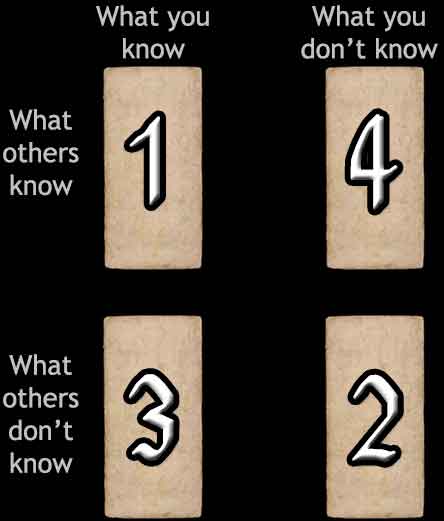
Difficulty: Varies
This tarot spread is used to enhance self-awareness. Questions about learning something about oneself or things that are hidden work very well with this tarot spread, although no question is necessary.
- This tarot card displays the obvious identity, the part of oneself that is consciously known and projected to others.
- This card indicates unconscious driving forces that neither the reader nor others are aware of about them, the great unknown. Nobody knows what this tarot card means, at least not yet...
- The part of oneself that is concealed, to keep others from discovering, is apparent in this card.
- This is the Blind Spot. This is what was asked about, that which this reading should bring awareness of. The reader may wish to pay close attention to these mannerisms.
Your Blind Spot Reading
| What you know | What you don't know | |
| What others know | 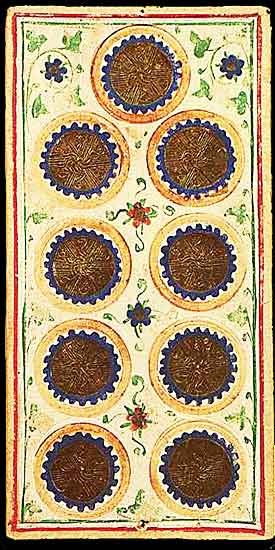 Nine of Coins |
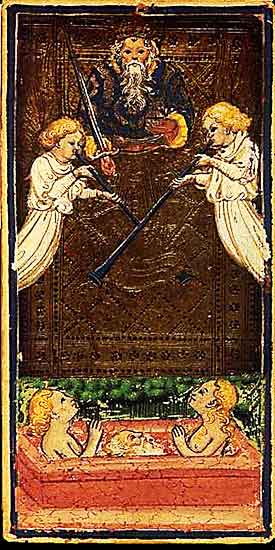 XX – Judgement |
| What others don't know | 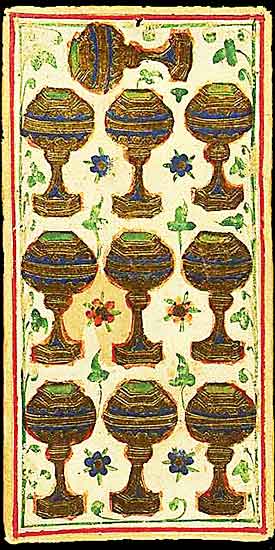 Ten of Cups |
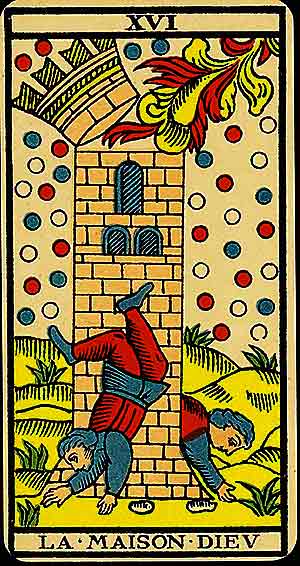 XVI – The Tower (Lost card, substituted here) |

This card displays your obvious identity, the part of you that everyone knows.
Nine of Coins
The Nine of Coins represents self-sufficiency, abundance, and material comfort. It signifies a time of enjoyment, where hard work has paid off, and you can enjoy the fruits of your labour. This card celebrates the pleasures of luxury, refinement, and personal achievement.
Symbolism: The stacked arrangement of nine coins reflects abundance and harmony. The stable design conveys accomplishment, stability, and satisfaction.
In Relationships: A relationship that is self-sufficient and fulfilling. The Nine of Coins suggests enjoying the fruits of love and mutual respect, with a sense of independence.
In Work: Financial success and personal achievement. This card represents enjoying the rewards of your hard work and attaining a comfortable, stable position in your career.
Spiritually: Fulfilment and the joy of having reached a place of peace and abundance in your spiritual journey.
When ill-dignified: Over-indulgence, isolation, or dependence. The Nine of Coins warns against relying too heavily on material comforts or becoming disconnected from others.

This card shows unconscious driving forces that neither you nor your company is aware of about you. This is the Great Unknown.
XVI – The Tower (Lost card, substituted here)
This card no longer exists, so the Marseille version is filling in. The Tower symbolises upheaval, sudden change, and the destruction of false structures. It heralds moments of revelation that, while shocking, clear the way for growth and truth.
Symbolism: The lightning bolt represents divine intervention shattering illusions and falsehoods. The crumbling tower signifies the collapse of unstable foundations. The falling figures illustrate vulnerability and the inevitability of change, while the broken shield reflects the fragility of ego and human constructs. Despite the chaos, the background suggests this upheaval is necessary for enlightenment.
In Relationships: The Tower signals a sudden shake-up, possibly a breakup or revelation. Though painful, it clears the way for honesty and authenticity.
In Work: Expect abrupt changes, such as a job loss or major restructuring. Though unsettling, this card pushes you to re-evaluate your priorities and rebuild stronger foundations.
Spiritually: The Tower challenges false beliefs and spiritual stagnation. A moment of crisis will lead to profound insight and transformation.
When ill-dignified: When reversed or ill-dignified, the Tower suggests avoiding necessary change, delaying the inevitable, or clinging to a crumbling situation. It warns that resisting transformation can lead to prolonged suffering.

The secrets you keep from others are shown by this card.
Ten of Cups
The Ten of Cups represents emotional completion, harmony, and fulfilment. It signifies a time of lasting happiness, contentment, and the realisation of emotional dreams. This card speaks to family, love, and the joy of emotional unity.
Symbolism: The ten chalices arranged in two rows of five suggest a perfect balance and alignment of emotional forces. The detailed decoration of the cups emphasises the richness of emotional life and the culmination of desires fulfilled.
In Relationships: The achievement of emotional harmony and fulfilment in your relationships. The Ten of Cups signals lasting love, happiness, and emotional contentment.
In Work: A sense of emotional fulfilment in your professional life, especially in work that aligns with your values and passions.
Spiritually: Complete emotional and spiritual harmony. This card invites you to embrace the fulfilment of your soul's desires and live in emotional balance.
When ill-dignified: Emotional discontent, disharmony, over-indulgence, or a sense that things are not as perfect as they appear. The Ten of Cups warns against taking happiness for granted.

This is your Blind Spot. This is what you asked about – what you wished to be made aware of by this reading.
XX – Judgement
Judgement is the call for awakening, renewal, and reckoning. It signals a time of reckoning with the past, a moment of judgement that clears the way for a fresh start and new direction.
Symbolism: The angel blowing the trumpet signals a divine call to action, summoning figures from their tombs to rise and transform. The symmetrical composition emphasises the balance between life and death, while the golden glow underscores the sacred nature of the awakening. The figures' age gap represents a new life, renewed through divine grace.
In Relationships: Judgement invites you to release past hurts and transform your relationships. It calls for honesty, introspection, and a fresh start in emotional matters.
In Work: A moment of reckoning, where past actions may come to light. This card suggests an opportunity for reinvention, a chance to leave behind outdated modes of working and embrace new ways.
Spiritually: Judgement calls for spiritual awakening and enlightenment. It asks you to evaluate your choices and rise to your higher calling.
When ill-dignified: Denial, resistance to transformation, or an inability to face the truth. This may indicate emotional or spiritual stagnation, or the refusal to heed the call of renewal.